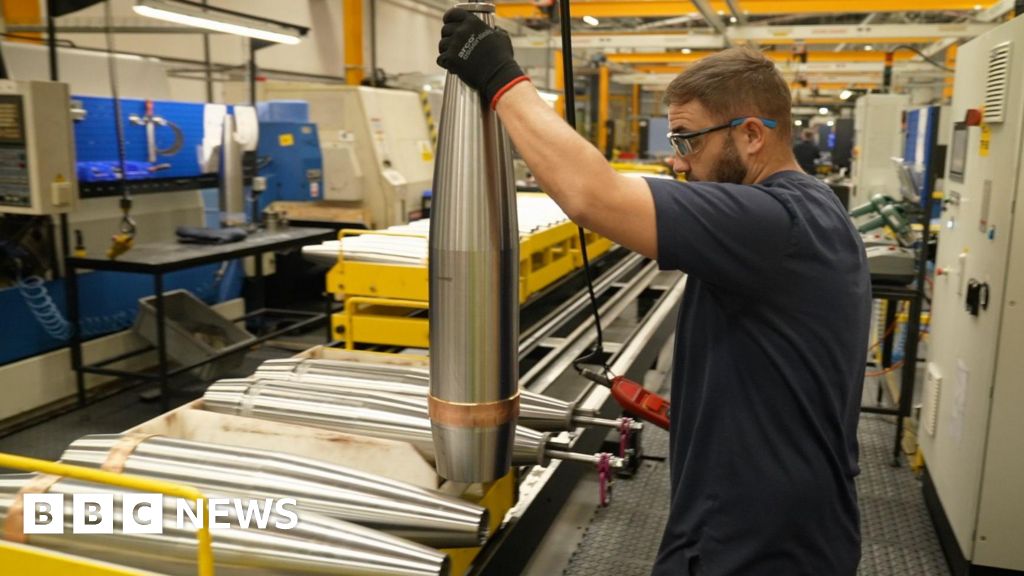ARTICLE AD BOX
By Daniel Thomas
Business reporter, New York
Image source, Getty Images
Image caption, Kellogg's Cereal plant workers are also protestingMore than 100,000 US workers will strike, or have threatened to in October, as a wave of industrial action dubbed "Striketober" hits America.
On Thursday, 10,000 workers at farm equipment maker John Deere walked out over pay and conditions.
Some 60,000 TV and film crew workers are set to strike on Monday, while 24,000 nurses could also protest.
It follows a rise in US union activity after decades of decline, as staff demanded better rights in the pandemic.
Employers - which often suppressed such efforts in the past - have found themselves on the back foot amid a labour shortage that's forced them to push up wages for the lowest paid.
Thousands of others were already on strike in October, including 700 nurses in Massachusetts, 2,000 New York hospital workers and 1,400 Kellogg factory workers in Michigan, Nebraska, Pennsylvania and Tennessee.
Some 6,500 lecturers in California are also on the brink of a walkout.
On Thursday, left wing Democratic Congresswoman Alexandria Ocasio Cortez voiced her support for the action using the hashtag #Striketober which has gone viral.
Deere & Company workers based mainly in Iowa and Illinois walked out from midnight on Thursday after rejecting a new contract they say insufficiently increases wages and weakens pension rights.
It is the largest US strike since workers at carmaker GM walked out two years ago,
"Our members at John Deere strike for the ability to earn a decent living, retire with dignity and establish fair work rules," said Chuck Browning, director of agriculture at the United Automobile Workers Union, which represents the workers.
Deere said it was determined to reach an agreement "that would put every employee in a better economic position".
Biggest Hollywood strike since World War Two
More than 24,000 nurses and other healthcare workers in California and Oregon also voted on Monday to allow a strike, after pay negotiations with their employer, the private hospital group Kaiser Permanente, stalled.
The nurses want a 4% annual pay rise, more to be done about staff shortages, and longer breaks to tackle pandemic-related burnout. Kasier says it hopes to resolve the matter swiftly.
Meanwhile, many US TV and film studios will stop work on Monday as 60,000 film and crew workers go on strike, in the biggest labour walkout in Hollywood since World War Two.
Their union, the International Alliance of Theatrical Stage Employees, accuses Hollywood giants such as Warner Bors and Netflix of failing to allow workers enough time off in their new contract.
It says workers frequently work 12-hour days - often without meal breaks - and lowest-paid earn less than a living wage.
#Striketober is a function of greedy bosses trying to recoup the un-recoupable.
Workers across every sector in our economy are being pushed to the brink to make up for the lost time during the pandemic shutdown.
Every strike is management’s fault.
The BBC is not responsible for the content of external sites.View original tweet on Twitter
The Alliance of Motion Picture and Television Producers (which represent the big media companies) says it continues "to negotiate in good faith".
Richard Bensinger, an organiser at Workers United, a union, told the BBC it was reminiscent of the 1930's, a period in which industrial action was commonplace in the US.
"Similarly back then the vast divide between the wealthy and the working class became intolerable, The decades-long decline of living standards for workers is not sustainable," he said.
'Pro-union president'
About a third of all US workers were in a union in the late 1960s, but that has declined over the decades due to anti-union laws and corporate crackdowns on organising.
Yet last year the union membership rate edged up for the first time in years to 10.8%. Gallup also estimated 65% of all Americans approved of unions, the highest in over two decades.
It's coincided with a swell of industrial action. In 2021 alone Amazon warehouse staff to New York museum curators have sought to unionise for the first time, and there have been months-long strikes by coal miners in Alabama and grocery workers at food giant Mondelez International.
They've been buoyed by the tacit support of Joe Biden - who has promised to be the most "pro-union president you've ever seen" - and from a more left leaning Democratic party.
But Gary Burtless of the Brookings Institutions told the BBC last month he doesn't expect a big shift towards unionism.
He said most low-paid workers still prefer unions "in theory" rather than practice and Mr Biden lacked strong enough working majorities in Congress to push through proposed legislation that would make it easier for workers to organise.

 3 years ago
74
3 years ago
74








 English (US) ·
English (US) ·